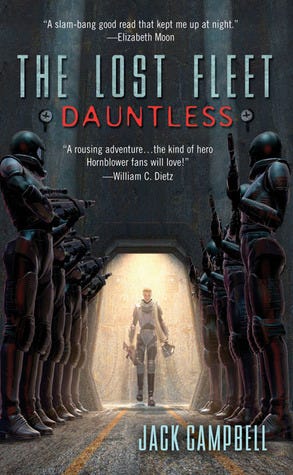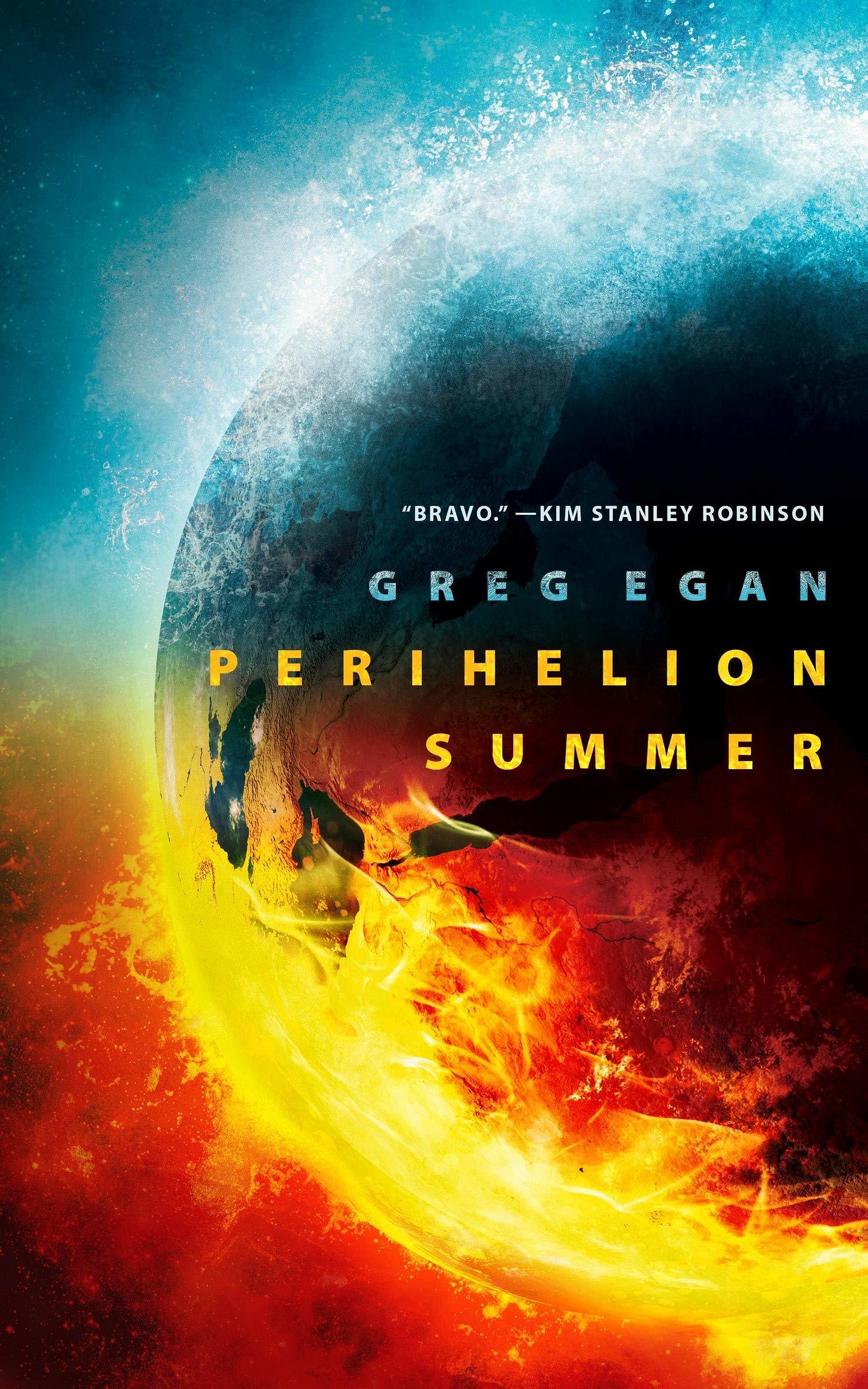Short Reviews for March 2024
The Lost Fleet, Perihelion Summer, The Right Hand of Command, The Poles in Britain
The Lost Fleet: Dauntless, by Jack Campbell (293 pp; 2006)
Who should read this? People who like military sci-fi that's bigger on tactics than gear.
Every so often, I try a military sci-fi novel. I usually set it down in boredom a little ways in, but for the first time in ages, I liked this one... though I don't plan to continue the series.
It's an excellent premise. A hundred years ago, at the start of an interstellar war, our protagonist went into coldsleep to escape a near-suicide battle. Just recently, he's been found and unfrozen by this strike force sent behind enemy lines (the war's still going on)... where (due to an assumed-posthumous promotion) he quickly ends up the senior officer in command! It turns out that training and capabilities have been degraded by the long war, and he's in a place to retrain them as he tries to lead them home.
Beyond the great premise, I like our protagonist's character. The questions and initial conflict are very well-done, as he tries to convince the fleet to follow his lead. And, they're well resolved in this book, as he leads them to success in unexpected ways, and more of the decay of the long war is revealed around him.
Unfortunately, everyone except our protagonist is a one-dimensional cypher. The conflicts around him are resolved well enough in this book... which doesn't leave anything holding my interest for the sequel. The mysteries around the war, and around the nations fighting it, and the other captains in the fleet, don't grab me because none of them have been built up to be interesting enough for me to care about them. Even though the fleet is still behind enemy lines at the end, I'm confident they'll get home eventually, and I don't really care about how.
The author's done a lot of his book really well, but that isn't good enough for me to fully overlook the other parts.
Perihelion Summer, by Greg Egan (224 pp; 2019)
Who should read this? People who want a book about runaway climate change and MacGyver'd plans.
I've enjoyed many of Greg Egan's science fiction books in the past. As I said last July, he loves exploring exploring physics what-if's and universes where things are slightly different. His best-drawn character, usually, is the universe itself.
This book starts off looking like another such exploration of strange or extreme conditions, as a microscopic black hole is bearing down on Earth on a not-precisely-known track, and our protagonists are planning to survive as much as they can amid potential gravitational and geologic weirdness. But, it turns out that the black hole simply changes Earth's orbit enough to drive the climate to extremes.
So, we have - literally - a novel about runaway climate change. Physics (aside from gas and fluid dynamics) makes no more of an appearance; the challenge here is just to survive a (quickly-brushed-over) freezing winter and (much longer-told) near-boiling summer. What's worse, the masses are portrayed as ignorant heedless fools, and our protagonists are just about the only ones we see with an effective plan. Society collapses as the power grid goes down, myriads die of heat, and our protagonists with their Plan hole out at sea after rescue missions to save the few they can.
This isn't a science fiction story, but a disaster story. But it isn't even a good disaster story. If I'm not getting a Greg Egan physics adventure, I want to read about an actual plot arc, not just the chronicles of our protagonists' plan.
The Right Hand of Command: Use and Disuse of Personal Staffs in the Civil War, by Robert Jones (256 pp; 2000)
Who should read this? People who like Civil War history, and people who like military history in general and want to explore the development of military theory.
This book starts out by contrasting several Civil War generals' use of personal staffs: McClellan, Lee, Sherman, and Grant. Then, later, it turns into a more extended discourse on how Grant's staff developed. The concept of personal staffs were still developing, and Grant was the only one whose use bears any resemblance to the modern concept. By contrast, Lee and Sherman did all their planning themselves.
Jones admits it's unclear how much impact this had on the war, though he points to a few instances where Lee's lack of a staff handicapped him. Also, it certainly made it easier for Grant to command such a large army.
But I can hardly criticize Jones for that shortcoming, because he was building all this history from the ground up. As he explains in his preface, sources here are very scanty. No one emphasized the staff in their memoirs; Jones had to go through the primary source documents to pull out individual staffers' names and see what they were doing under each commander. Jones is paving new ground here on an underappreciated aspect of Civil War history, and military history in general.
The Poles in Britain, 1940–2000, edited by Peter D. Stachura (140 pp; 2003)
Who should read this? People interested in the sociology of exile communities.
This collection of historical essays about the Polish diaspora in Britain under World War II and Communism drew my interest, because I'm fascinated by how the Polish government-in-exile remained around throughout Communism - despite the western powers withdrawing their recognition - before finally recognizing Lech Walesa's new government as their duly-elected successors. I haven't been able to find much on them after WWII, though, so I was very hopeful about this book.
Unfortunately, it just scratches the surface. The political disputes in the government-in-exile are quickly covered in one essay, as are the disagreements within the Polish exile community about its importance. But it's all too quick; I want to know so much more about the various people they discuss. Also covered are various sociological issues in the Polish exile community (in great depth), and the government-in-exile's records and historical museum. Much of this is interesting, but more than the sociology of the Polish-British community, I'm primarily interested in the government-in-exile itself. There, I want so much more.
I'm not sure whether what I want yet exists in English. If so, I haven't been able to find it.








I basically share your opinion of the Campbell series. Though it took me till the end of book three to arrive at the same conclusion you did after book one. I suspect it's because you're wiser than me:
https://www.wearenotsaved.com/p/the-12-books-i-finished-in-september-one-of-which-im-not-allowed-to-talk-about#fleet